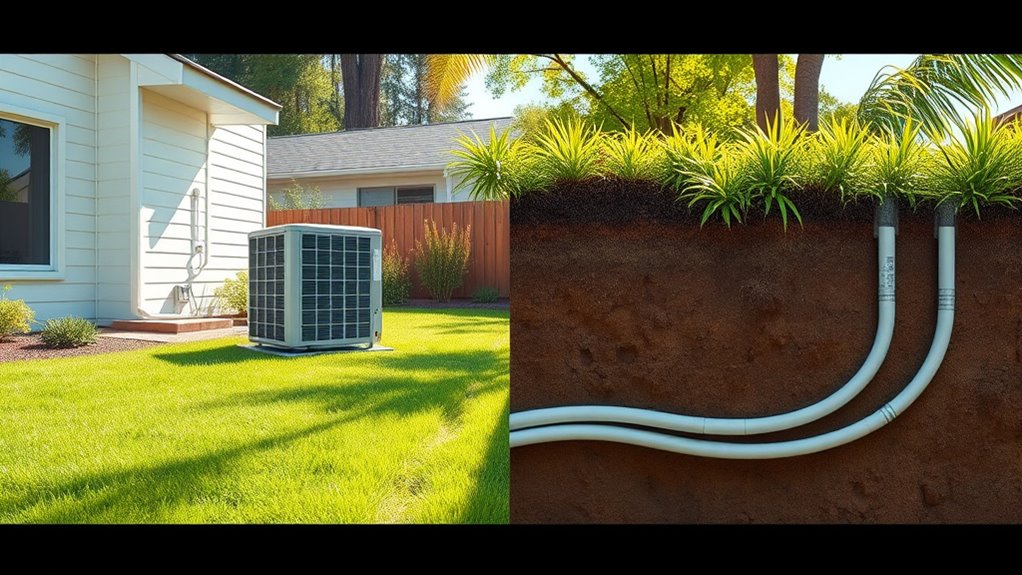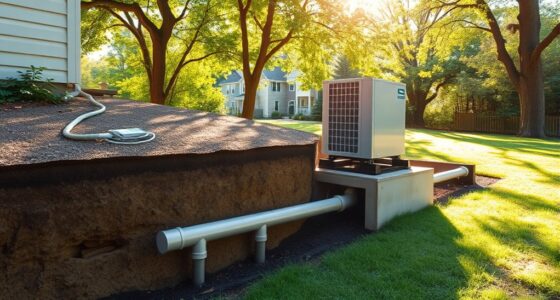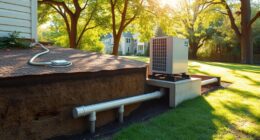Geothermal heat pumps outperform air-source units in energy efficiency, offering up to 600% efficiency and reliable operation even in extreme cold conditions below -22°F. They last longer—over 25 years indoors and 50 years for ground loops—while needing less maintenance. These systems also reduce utility bills, cut greenhouse emissions, and can boost your home’s value. Plus, underground installation keeps your landscape pristine and protected from weather. Explore the many benefits that make geothermal a smarter, longer-lasting choice.
Key Takeaways
- Geothermal heat pumps operate efficiently in extreme cold, maintaining performance below -22°F, unlike air-source units that struggle below -13°F.
- Underground ground loops provide stable temperatures, resulting in higher efficiency—up to 600%—compared to air-source systems.
- Longer lifespan of underground components (over 50 years) reduces maintenance and replacement costs versus shorter-lived air-source units.
- Geothermal systems have minimal outdoor exposure, decreasing weather-related wear and increasing durability.
- They deliver significant environmental benefits by reducing greenhouse gas emissions up to 85%, supporting sustainability efforts.
Superior Energy Efficiency and Performance
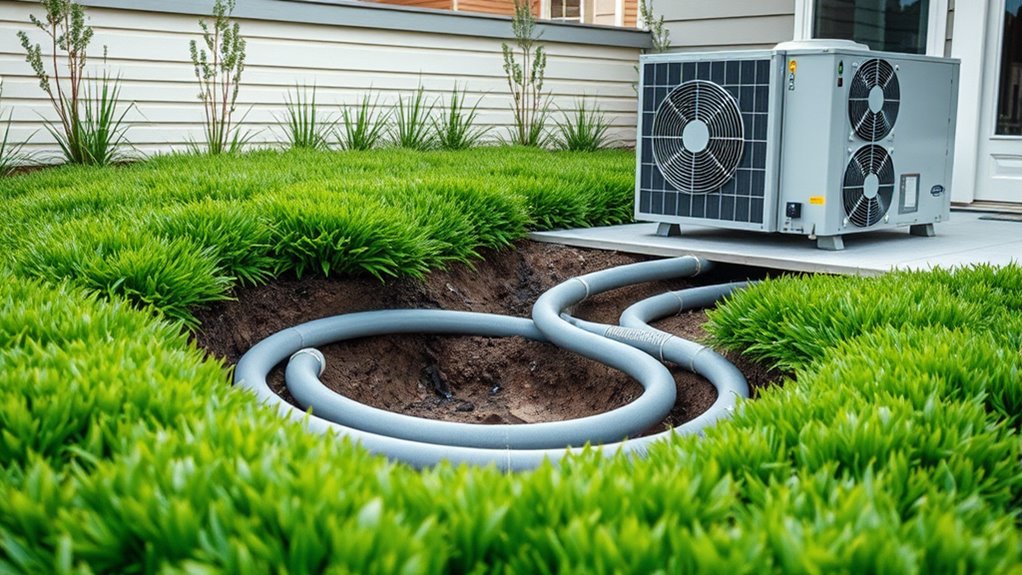
Geothermal heat pumps deliver superior energy efficiency and performance compared to traditional systems. These ground source heat pumps achieve efficiencies up to 600%, producing six units of heat for every unit of electricity, far surpassing air-source systems. The underground ground loops maintain a stable temperature of about 45°F, ensuring consistent performance regardless of outdoor weather. This stability allows geothermal heat pumps to operate efficiently even in extreme cold, where they keep heating reliably below -22°F, unlike air-source units that struggle below -13°F. Because of the underground environment, geothermal systems experience less performance degradation over time, maintaining high efficiency and reducing operational costs. Additionally, proper installation and maintenance techniques can optimize the overall system performance and longevity. Utilizing geothermal energy reduces reliance on fossil fuels and contributes to a more sustainable energy future. Overall, geothermal heat pumps provide significant energy savings and reliable, high-performance heating year-round.
Consistent Operation in Extreme Climates
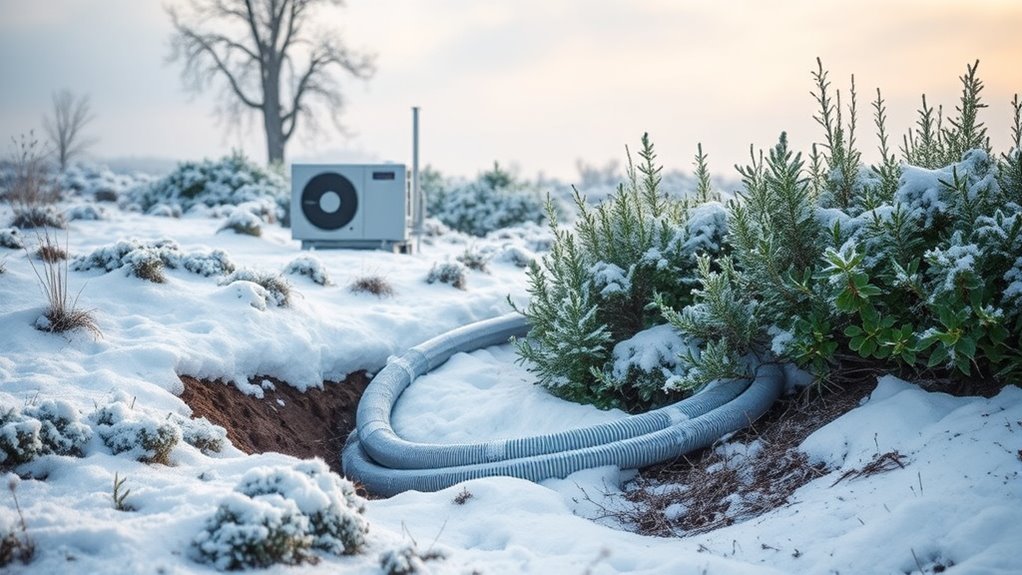
Despite harsh winter conditions, geothermal heat pumps continue to operate efficiently because their underground loops maintain a steady ground temperature around 45°F. This consistent underground heat source guarantees reliable heating even in extreme cold, where air-source systems struggle below -13°F. Because the ground temperature remains stable, your system’s performance stays high, offering dependable climate resilience during prolonged freezing periods. The underground loops are shielded from weather extremes, preventing issues like ice buildup or frost that impair air-source units. This stability translates into greater efficiency, with geothermal systems achieving up to 600% performance. Additionally, the protected underground loops contribute to a longer lifespan for your heat pump, reducing the need for early replacements and ensuring lasting, reliable heating regardless of outdoor temperature fluctuations. Furthermore, the automation of monitoring systems in geothermal setups allows for optimal operation and early detection of potential issues, enhancing system longevity and performance.
Longer Lifespan and Reduced Maintenance Needs
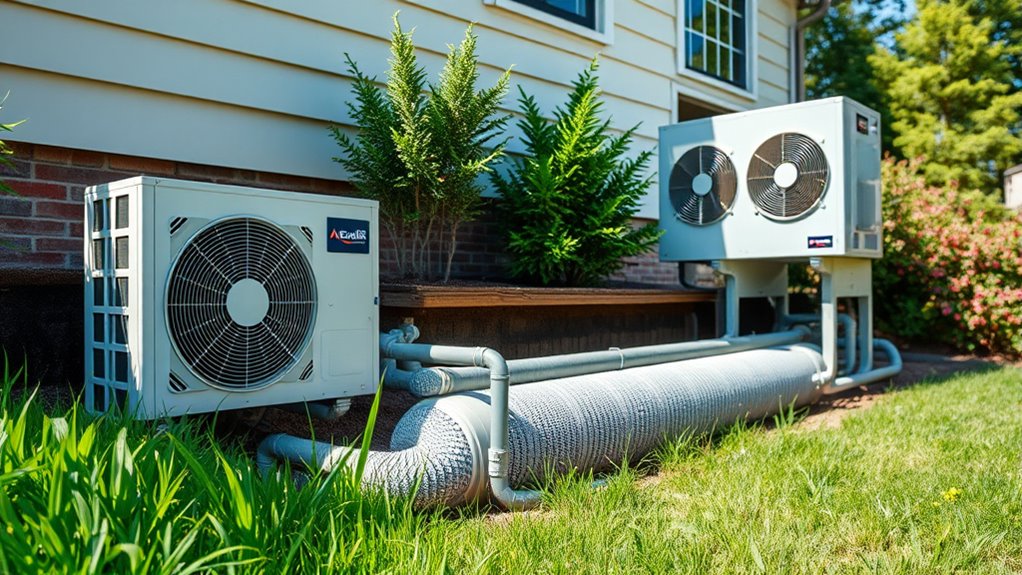
Because their main components are housed underground and protected from the elements, geothermal heat pumps typically last over 25 years for indoor units and more than 50 years for ground loops. This extended lifespan is due to their durability and resistance to corrosion, as the underground ground loops are shielded from weather and environmental wear. Maintenance needs are lower because the indoor units are protected from outdoor components, reducing repair frequency and simplifying upkeep. Since the outdoor components are less exposed to elements, they experience fewer breakdowns, making repairs less common. Additionally, the protected underground components help prevent weather-related damage, further extending the system’s longevity. Implementing regular system security protocols can also help detect potential issues early and prevent costly repairs. The underground installation process itself reduces exposure to environmental stressors, contributing to the system’s overall durability. Overall, this durability and reduced maintenance translate into lower ownership costs over time, making geothermal systems a smart, long-lasting investment compared to air-source heat pumps.
Greater Long-Term Cost Savings
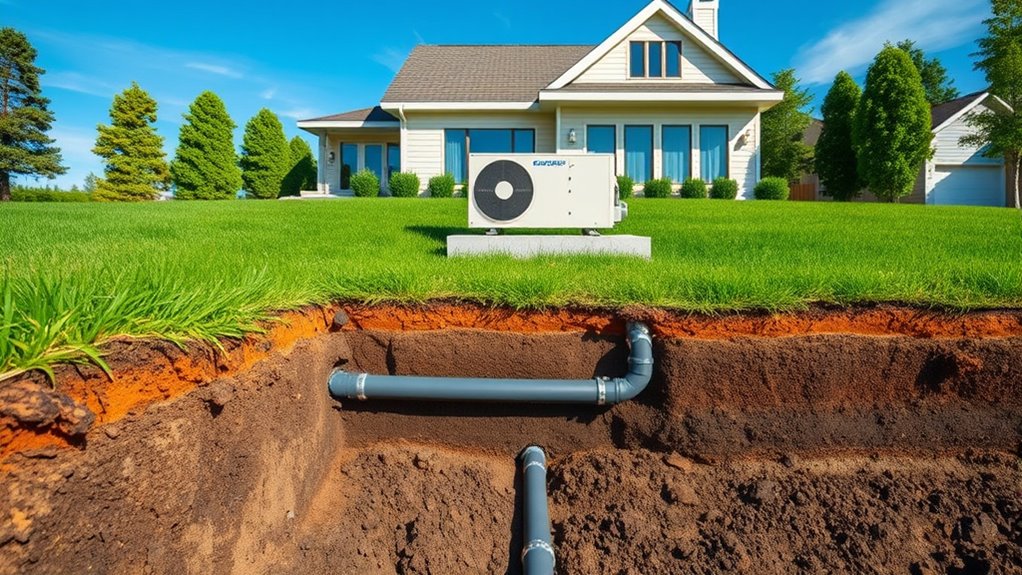
Investing in a geothermal heat pump can lead to significant long-term cost savings. Thanks to its superior energy efficiency—up to 600%—you’ll see lower utility bills over time. Although the initial costs are higher, the underground ground loops last over 50 years, reducing replacement and maintenance expenses. The system’s durability ensures consistent efficiency regardless of outdoor weather, maintaining savings during extreme seasons. Over its lifespan, a geothermal system remains cost-effective by minimizing upkeep and replacement needs. Here’s a quick comparison:
| Feature | Benefits |
|---|---|
| Energy efficiency | Up to 600%, reducing costs |
| System lifespan | Over 50 years, lowering replacement costs |
| Maintenance | Less frequent, saving money |
| Initial costs | Higher, but offset by savings |
| Utility bills | Can drop up to 50% |
A key advantage is that geothermal systems operate with less noise compared to traditional systems, enhancing overall comfort and reducing sound disturbances. Additionally, geothermal systems benefit from advanced technology that further improves their efficiency and reliability. Incorporating proper installation practices ensures optimal performance and longevity of the system. Moreover, choosing geothermal energy can help mitigate the environmental impacts associated with traditional heating methods, contributing to a cleaner and healthier environment. Furthermore, geothermal systems are recognized for their renewable energy qualities, supporting sustainable building practices.
Enhanced Environmental Benefits
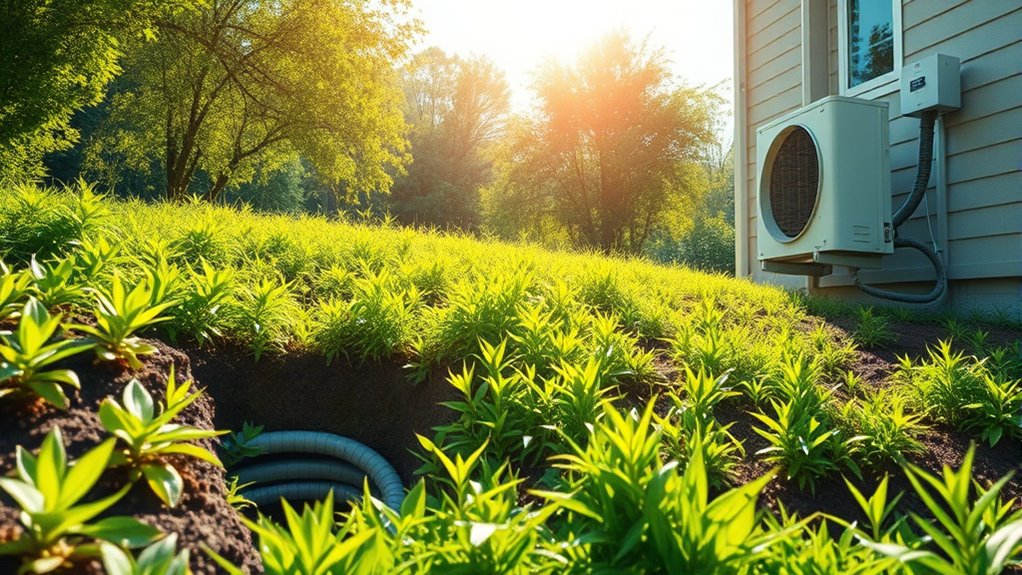
Choosing a geothermal heat pump not only saves you money but also offers substantial environmental advantages. It harnesses renewable energy from the earth, markedly reducing greenhouse gas emissions—up to 85% compared to gas furnaces. This considerably lowers your overall environmental impact and carbon footprint. With high energy efficiency across all climates, geothermal systems decrease reliance on fossil fuels, supporting sustainable and climate-friendly solutions. Their underground heat exchange maintains consistent performance, resulting in low emissions and minimal environmental disruption. Additionally, the long lifespan of geothermal ground loops (over 50 years) reduces waste and resource use. By opting for a geothermal system, you contribute to eco-friendly living and help promote community-wide renewable energy networks, making your home more sustainable and environmentally responsible. Proper system maintenance and operation ensure optimal performance and longevity of the system.
Higher Incentive and Tax Credit Opportunities
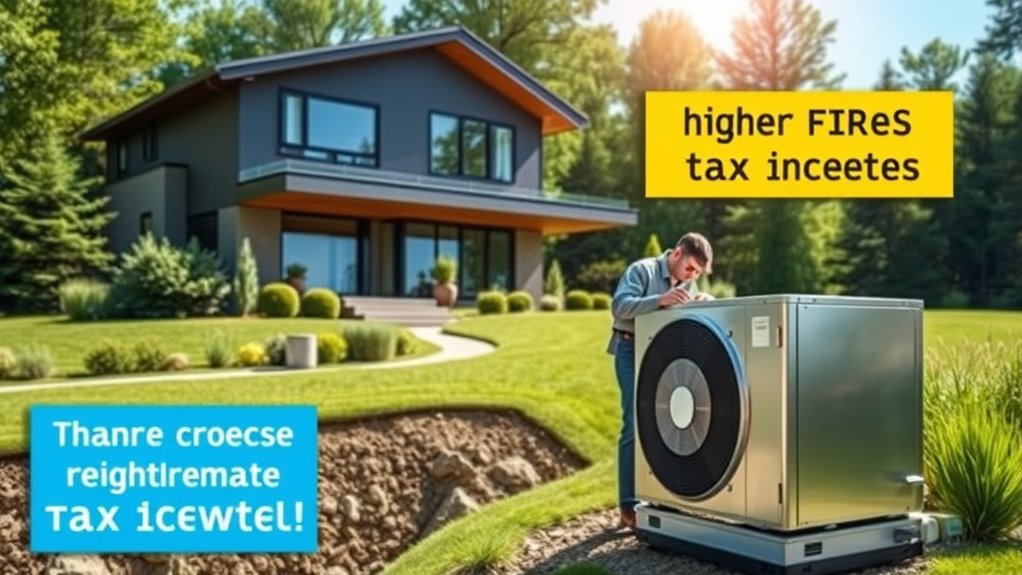
Taking advantage of higher incentive and tax credit opportunities can substantially lower the upfront cost of installing a geothermal heat pump. The Investment Tax Credit (ITC) covers 30% of installation costs for geothermal systems, unlike air-source heat pumps. Additionally, the Inflation Reduction Act offers an extra 30% federal tax credit for qualified geothermal systems, boosting financial incentives. Many state and local rebate programs favor geothermal systems due to their efficiency, providing further rebates that reduce initial expenses. These incentives make geothermal heat pumps more affordable upfront, leading to greater energy savings over time. The cost savings associated with these incentives can significantly improve the return on investment for geothermal systems. Furthermore, understanding government incentives can help homeowners maximize their financial benefits when choosing geothermal options. Recognizing the financial advantages of geothermal systems can motivate more homeowners to consider sustainable energy solutions.
Increased Property Value and Aesthetic Appeal
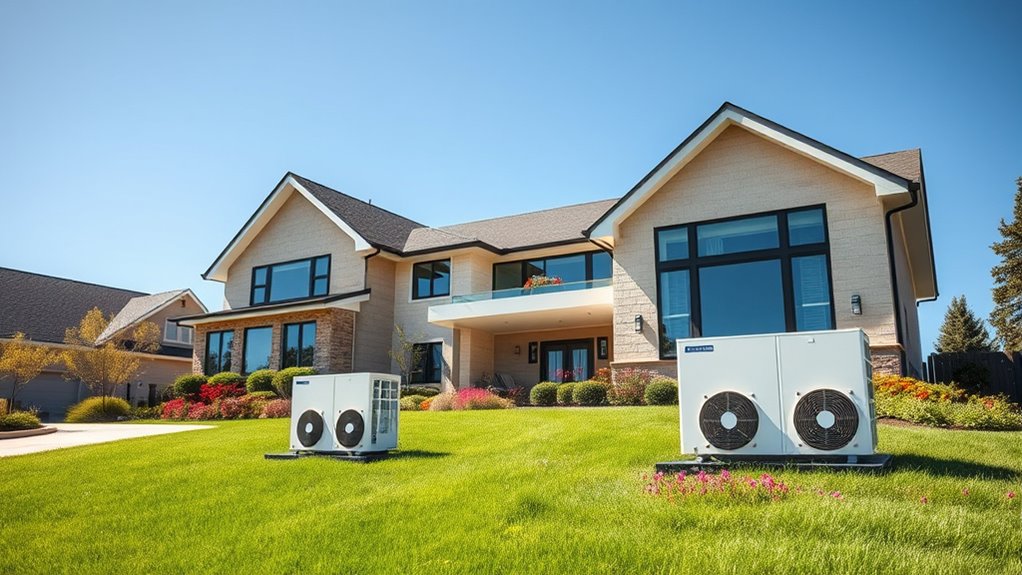
Installing a geothermal heat pump can boost your property’s value by showcasing its energy efficiency and eco-friendly features. Since the underground loops are hidden, your home’s appearance remains undisturbed, preserving its curb appeal. Over time, this investment can enhance your property’s attractiveness and long-term marketability. Additionally, because geothermal systems are more sustainable than traditional options, they appeal to environmentally conscious buyers, further increasing your home’s desirability. Moreover, the integration of renewable energy technology can set your property apart in a competitive real estate market. Embracing innovative automation solutions can also improve the overall functionality and appeal of your property, making it more attractive to prospective buyers. Incorporating sound design principles, such as quiet operation and seamless integration, can further enhance the comfort and appeal of your geothermal system.
Enhanced Curb Appeal
Because geothermal heat pumps have no outdoor units visible, they help maintain your home’s aesthetic appeal and curb appeal. Their discreet installation keeps the landscape beauty intact and minimizes visual clutter. Here are three ways they enhance your property’s curb appeal:
- The underground ground loops stay hidden, preserving the clean look of your home exterior.
- Eliminating bulky outdoor equipment results in a sleeker, more modern appearance.
- The streamlined design boosts property aesthetics, making your home more attractive to potential buyers.
- Additionally, security features help protect sensitive customer data and ensure safe transactions, further adding to the overall value and appeal of your property.
- The absence of visible components also reduces the risk of weather-related damage, maintaining the aesthetic integrity of your home over time.
- Moreover, integrating sustainable energy solutions can further increase your home’s value and reduce long-term energy costs.
- Implementing environmentally friendly technologies aligns with modern trends and appeals to eco-conscious buyers, enhancing your home’s marketability.
Minimal Surface Disruption
Since geothermal heat pumps install their ground loop underground, they cause minimal disruption to your landscape. The underground installation preserves your landscape aesthetics by hiding the ground loop and outdoor equipment from view. Unlike air-source systems with bulky outdoor units that can clutter your yard, geothermal systems leave the surface clear and unobstructed. This reduces surface disruption and helps maintain your property’s curb appeal. Because the main components are buried or housed indoors, there’s no outdoor noise or visual impact, supporting landscape preservation. Additionally, the use of environmentally sustainable energy sources makes geothermal systems an eco-friendly choice. This minimal surface disruption not only keeps your outdoor space looking neat but also can boost your property value, as potential buyers appreciate the clean, unobtrusive installation and the preservation of outdoor usability.
Long-Term Property Investment
Choosing a geothermal heat pump can substantially boost your property’s value and curb appeal. This eco-friendly upgrade enhances your property investment by increasing property value by up to 5%, as buyers recognize its energy efficiency and modern infrastructure. Geothermal systems offer a long lifespan—over 50 years for ground loops—ensuring durable, low-maintenance energy solutions that appeal to buyers and improve resale value. Additionally, their underground installation preserves outdoor aesthetics and minimizes noise pollution, creating a quieter, more attractive environment.
Consider these benefits:
- Enhanced property value and market appeal due to energy efficiency and sustainability.
- Long lifespan and low maintenance, reducing future costs.
- Improved environment by lowering noise pollution and fostering eco-consciousness.
Greater Reliability and Durability
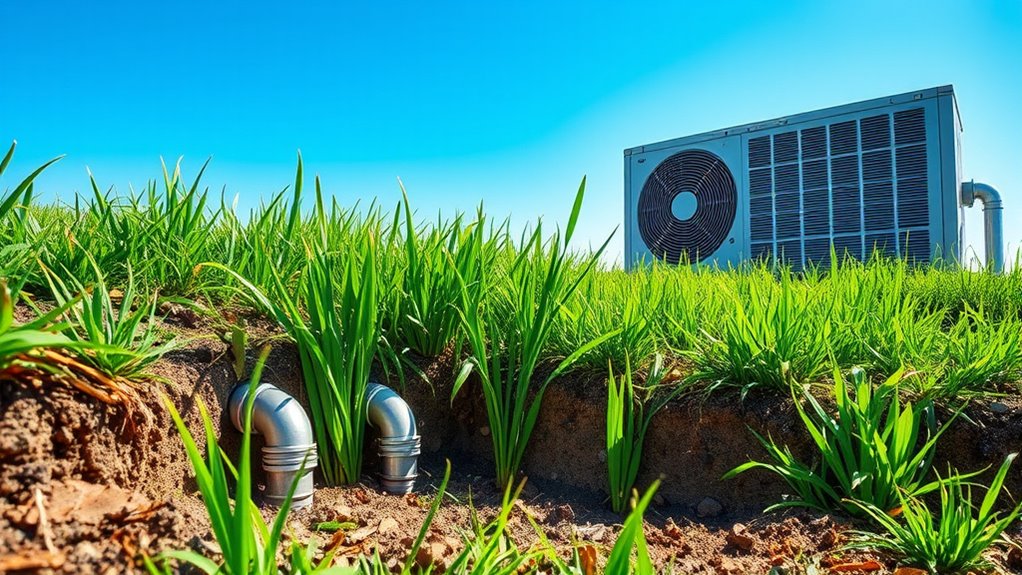
Because your geothermal system is housed indoors, it’s protected from weather and environmental damage, making it last much longer than traditional units. The underground ground loops can last over 50 years with minimal maintenance, offering long-term reliability. With fewer corrosion issues and a lifespan that surpasses air-source heat pumps by 92%, you can count on your geothermal system to be dependable for decades.
Longer System Lifespan
Geothermal heat pumps offer a longer system lifespan compared to traditional air-source systems, providing greater reliability and durability. Their indoor placement shields components from harsh outdoor elements, reducing wear and tear. Additionally, the underground ground loops are protected from weather, corrosion, and temperature fluctuations, markedly extending their lifespan. This results in fewer long-term maintenance needs and fewer replacements. Specifically:
- Indoor components last over 25 years, while ground loops can exceed 50 years.
- Protected environment enhances durability and reduces outdoor-related damages.
- Longer lifespan means increased reliability, saving you money over time.
Less Maintenance Needed
Since geothermal heat pumps are installed indoors, they are less exposed to environmental elements like dirt, snow, and temperature fluctuations, which often cause outdoor air-source units to require frequent maintenance. With weather protection provided by underground components, you’ll experience less corrosion and wear, leading to increased durability. Indoor installation shields the system from outdoor exposure, reducing the risk of damage and breakdowns. This results in greater reliability over time, with fewer repairs needed. Because geothermal systems face fewer environmental stresses, maintenance is simpler and less frequent, and repair costs stay lower. Overall, these factors mean your geothermal heat pump will operate more consistently and last longer, offering you peace of mind and long-term savings.
Compatibility With Renewable Energy Systems
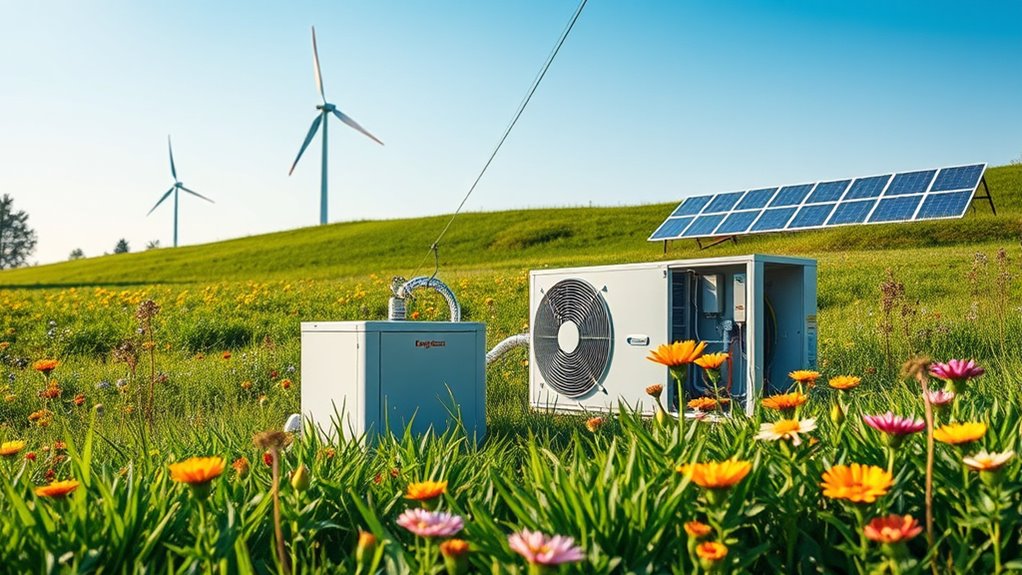
Integrating geothermal heat pumps with renewable energy systems offers a highly effective way to maximize sustainable power use. Their compatibility with solar PV and other renewable sources enhances efficiency and reduces reliance on fossil fuels. You can leverage geothermal’s stable underground temperature to maintain consistent performance even during extreme climate variations.
- Geothermal systems work seamlessly with solar PV, lowering overall energy demand.
- Their operation supports grid stability, helping to balance renewable energy fluctuations.
- Many installations qualify for incentives, encouraging integration with broader renewable energy efforts.
Frequently Asked Questions
What Are Some Advantages That Geothermal Heat Pumps Have Over Water Source Heat Pumps Using a Cooling Tower?
You’ll notice that geothermal heat pumps last longer, often over 25 years, and need less maintenance than water source systems with cooling towers. The underground loops stay protected from environmental damage, reducing corrosion and fouling. They operate more efficiently because underground temperatures are stable, unlike cooling towers that depend on variable air conditions. Plus, geothermal systems use less water and chemicals, making them more eco-friendly and cost-effective over time.
What Are 5 Advantages of Geothermal Energy?
You’re curious about geothermal energy’s benefits. It offers higher efficiency, reaching up to 600%, and provides consistent performance year-round because it taps into the earth’s stable underground temperature. Its long lifespan, over 50 years for underground loops, means fewer replacements. Plus, it’s less affected by outside weather, ensuring reliable operation during extreme cold or heatwaves. While initial costs are higher, you save money over time with lower operating expenses.
Which Is Better, a Heat Pump or a Geothermal?
Imagine a world where your home stays warm in the coldest winter months. You’re wondering whether a traditional heat pump or a geothermal system is better. Geothermal heat pumps outperform air-source ones with higher efficiency, even in extreme cold. They’re more reliable, cost-effective long-term, and require less maintenance. If you want consistent comfort and savings over time, geothermal systems are your best choice, providing steady warmth regardless of outdoor weather.
Which Is Better, an Air Source or Ground Source Heat Pump?
When deciding between an air source and ground source heat pump, consider your climate and budget. You might find that ground source systems, despite higher upfront costs, offer greater efficiency, durability, and lower operating expenses over time, especially in cold climates. Air source units are easier to install and less invasive but may struggle in extreme cold and require more maintenance. Choose based on your long-term comfort and savings goals.
Conclusion
Choosing a geothermal heat pump isn’t just about long-term savings; it’s about embracing a reliable, efficient system that performs consistently—even in extreme weather. As you consider your options, remember how its durability often coincides with lower maintenance needs and environmental benefits. When you invest in a geothermal system, you’re not only boosting your property’s value but also aligning with a sustainable future. It’s a decision that naturally fits into a smarter, greener lifestyle.
